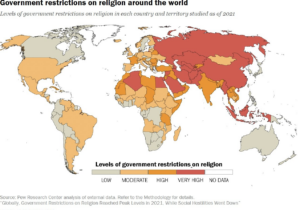Last month during the 2021 International Religious Freedom Summit in Washington, DC, numerous experts and government officials addressed how the issue applies to several regions. Members of different faith communities who experienced religious persecution first-hand gave testimonials, and different organizations hosted dialogues about the state of religious freedom issues worldwide. Many of these speakers covered the Chinese Communist Party’s hostility toward religious freedom and how China uses technological advancements to target religious minorities, such as Uighur Muslims. Others talked about the mass atrocities that the Yazidis and Rohingyas face, as well as religious persecution in Africa. Multiple panels continued an ongoing and fervent discussion about the state of religious freedom in India, the world’s largest democracy.
In a country known for its pluralism and Mahatma Gandhi’s ethic of non-violence and coexistence, the hostility and discrimination that religious minorities face have been nothing short of shocking and disappointing. More specifically, with the rise of the Bharatiya Janata Party (BJP) and Narendra Modi’s Hindu nationalist ideals, Muslims, Christians, and Dalits have been targets of increasing persecution at the hands of both the state and local mobs.
In a session hosted by the Indian American Muslim Council on the challenges and opportunities for religious freedom in India, the national director of Amnesty International USA, Joanne Lin, highlighted how the BJP government has targeted organizations like Amnesty. The group was forced to halt all operations in India, and it saw this as one example of “the Indian government activating their overall governmental framework” to crush opportunities for upholding religious freedom.
In particular, the Citizenship Amendment Act (CAA) and the National Register of Citizens (NRC) have made life harder for these groups. The CAA, enacted by the BJP-led government, provided fast-track access to citizenship for non-Muslims migrating from Afghanistan, Bangladesh, or Pakistan, notably excluding Muslims from eligibility. The NRC, which requires that those in the state of Assam in northeast India prove that they were in India prior to the Partition, excludes nearly two million people who are now at risk of deportation.
Because of these systematic and ongoing egregious violations in India, the United States Commission on International Religious Freedom (USCIRF) has recommended that India be designated as a Country of Particular Concern (CPC). USCIRF commissioner Anurima Bhargava notes that such national and state policies “create an ecosystem which is taking a turn from the historical protection of pluralism” typically seen in India, and many are worried about the government’s efforts to silence those who speak about this issue.
The Unlawful Activities Prevention Act (UAPA) is an older law that the government reactivated to squelch dissidence and those who might advocate sedition. Initially created to fight terrorism and maintain India’s sovereignty, authorities now use it to detain journalists and advocates, thus threatening civil liberties.
Anti-conversion laws in India, especially those targeting interfaith marriage, have also limited religious freedom. Coupled with disinformation and stories of forced conversions, government officials and non-state actors have incited violence against religious minorities, especially during the COVID-19 pandemic. USCIRF’s 2021 Annual Report notes that “in 2020, for example, mobs—fueled by false accusations of forced conversions—attacked Christians, destroyed churches, and disrupted religious worship services.”
In contrast, organizations like Hindus for Human Rights are working to advance human rights in South Asia and America from a Hindu perspective, rejecting the current narrative that the persecution of non-Hindus is okay. Believing that every human is inherently divine and that “many paths of worship all lead to God,” groups such as these have their own theological reasoning to support the protection of religious minorities in India.
The United States must think hard about how to deal with India and its religious freedom problems. If this subcontinent were to lose its liberal democracy and human rights, it would be a loss to democracy worldwide. As the world’s largest nation structured around democratic principles, it is a massive ally to the US, so there is a great urgency to make sure that America’s underlying sense of shared values with this rich nation is not lost.







 Sponsor a student for Christianity & National Security 2024
Sponsor a student for Christianity & National Security 2024